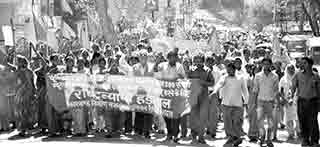
All India General Strike
Working Class Demands Reversal of Ongoing Economic Policies
The countrywide General Strike on 28 February 2012 received a huge response and was a clear mandate by the working class for the reversal of ongoing economic policies of liberalisation and privatisation.
More than 10 crore workers, ranging from organized to unorganized sector, from industrial workers to agricultural workers, participated in this strike. In particular, contract workers employed in PSUs and government departments played a major role in this strike. Many states witnessed Bandh during this strike. The Strike witnessed a visible impact on almost all the sectors of the economy: coal, steel, petroleum, telecom, defence, banks, insurance, electricity, transport, port and dock, anganwadis, construction, brick-kilns, beedi etc.
The Strike call was given by all the Central Trade Unions in the country and was endorsed by almost all the major Independent National Federations of employees and workers. The demands which the striking workers raised included curbing price rise; creation of employment; strict enforcement of all basic labour laws, stringent punitive measures for violations; universal social security cover for unorganized sector workers, creation of a National Social Security Fund with adequate resources; a stop to disinvestment in central and state PSUs; no contractualisation of permanent/perennial work, payment of wages and benefits to the contract workers at the same rate as to regular workers; amendment of Minimum Wages Act to ensure universal coverage irrespective of schedules, and fixation of statutory minimum wage at not less than Rs 10,000/- with indexation; removal of all ceilings on payment and eligibility of Bonus, Provident Fund, increase in quantum of gratuity; assured pension for all, compulsory registration of trade unions within a period of 45 days, and immediate ratification of the ILO Conventions numbers 87 and 98.
A brief report and highlights of AICCTU's,
AIALA's and CPI(ML)'s participation in the strike follows.

In the national capital, the strike received a very powerful response. In the Wazirpur Industrial area, thousands of workers were out on the streets enforcing the strike with militant energy, clashing with police at some places as they closed factories. AICCTU played a leading role in organizing the strike in this area, with a week-long campaign prior to the strike. A huge mass meeting during the strike was addressed by AICCTU, AITUC, CITU and UTUC leaders, and AISA and AIPWA activists. In Delhi’s Bhorgarh Industrial area too a very impressive rally of thousands of workers led by AICCTU and CITU was held to enforce the strike. In Jhilmil and Patparganj Industrial areas too it was mainly the AICCTU and CITU that led the strike and campaign. The employees’ union of Lala Ramswarup (LRS) Institute of Respiratory Diseases and TB Hospital at Mehrauli, affiliated to AICCTU, held a dharna in support of strike. AICCTU members in MTNL and AICCTU-affiliated unions participated in a joint protest at Jantar Mantar. A mass meeting of 500 workers at took place at DTC headquarters, addressed by AICCTU General Secretary Comrade Swapan Mukherjee among other central leaders of other central trade unions. A procession was held by AICCTU in Okhla.
In Bihar, agricultural workers struck work throughout the State, while workers in industrial areas around Patna went on strike, and held a huge procession, blocking the Dak Bangla crossing. At Bhagalpur, members of all the unions affiliated to the AICCTU - Bihar State Construction Workers’ Union, Kamgar Mahasangh, municipal employees, transport workers’ union and others held rallies from three different locations in the city before merging at Kotwali square and marching to the Station through the main areas of the city. Half of the participants in the rally were domestic women workers. In the rural areas, brick kiln workers went on strike, and AICCTU and AIALA jointly organised rallies and meetings that were led by local and district leaders. 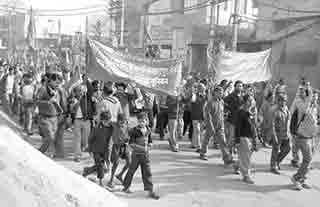
In Jharkhand, thousands of workers affiliated to the Jharkhand Construction Workers’ Union (AICCTU-affiliated) marched from the CPI(ML) State office to the Commissioner’s office through the main streets of Ranchi, where they submitted a memorandum to the Labour Minister, and returned to Albert Ekka Square, where a mass meeting was held.
Rallies were held in ten panchayats of Bagodar block, in which thousands of rural workers took part. The Grand Trunk road was blockaded for two hours at Bagodar town. Rallies and meetings were held in five panchayats each of Saria and Birni blocks, in ten panchayats of Jamua and three of Dewari, and at two places in Rajdhanwar, while an impressive rally was held at Gawan. An impressive rally and public meeting was held in the Gandey Assembly constituency, which was addressed by the Party’s General Secretary Comrade Dipankar, CPI(ML) leader and MLA Comrade Vinod Singh, Politburo member Comrade DP Bakshi and other district and State leaders. In Garhwa, a protest march was held that turned into mass meeting at the Ranka Mod. Impressive rallies were held in Bhawnathpur. At Chautha village in Hazaribagh’s Bishungarh, the road was blockaded. Patratu block office was gheraoed by hundreds of party workers, and a demonstration was held in Gumla.
The Mugma collieries (ECL) witnessed a total strike. The strike in BCCL was nearly total, and partial in CCL Bermo, due to the anti-strike stance of BMS and INTUC at the grassroot level and total opposition by the Dadai faction of INTUC. AICCTU led an effective campaign and several workers came forward spontaneously to join the strike. CCL Hazaribagh was completely affected by the strike. The strike was partial in Bokaro Steel Plant, but about half of all contract workers went on strike. Banks and LIC were completely on strike all over Jharkhand.
More than eight thousand agricultural workers under the banner of AIALA struck work in over 80 panchayats covering eight districts of Tamil Nadu. In Chennai, AICCTU participated in joint demonstration at two centres with 300 members. A complete strike was ensured in several industries under AICCTU’s leadership. The workers under the banner of AICCTU also ensured the participation of workers of TVS and TI groups in the strike. At Thiruvottiyur, another centre of big industries, AICCTU’s presence ensured strike in almost all industries. There was an overwhelming response among transport workers and only very few buses plied the metro. 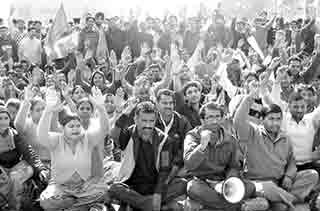
In neighbouring Guduvancheery, AICCTU participated in a joint Rally along with AITUC. In Thiruvellore, a rally marched under the banner of AIALA and 150 courted arrest. In Coimbatore, the strike in Pricol, ITPL and Suba plastics was total. Traders in the Periyanayackanpalayam area also closed their shutters. In Salem, 100 workers of AICCTU, the majority of them women, participated in the strike. In Kuppanur of Salem, 16 AIALA members were arrested for picketing.
In Dindigul, a rally marched through the streets and culminated in a mass meeting. In Thanjavur town, AICCTU members participated in a joint rally. In Thanjavur and Nagapatnam districts, there were demonstrations and road roko agitations at 6 centres in which more than 650 members took part.
In Namakkal dictrict , AICCTU participated at 3 centres in a joint rally. In Gandarvakottai of Pudukottai about 150 members participated in a rally organized by AIALA. In Villupuram, 175 AIALA members courted arrest at Thirunavalur, and 90 members courted arrest at Chenji. AICCTU took part in a joint demo at Nagarkoil in Kanyakumari district. About 200 Contract labours of the Ordnance Factory, Tiruchi went on strike and 50 members participated in a joint TU demo at Tiruverumbur. In Karur also AICCTU participated in a joint TU rally.
In Tirunelveli, more than 100 AICCTU workers participated in a joint demonstration. There was a scuffle when police, after giving permission for demonstration, tried to arrest the workers citing election code for the by-election in Sankarankoil in the district.
In Chhattisgarh, workers began blockading the main Maroda Gate of the Bhilai Steel Plant (BSP) at 5:30 a.m, with the strike call having been jointly given by AICCTU, AITUC, CITU, BMS, HMS and INTUC. Contract workers took active part in making the strike successful. 90 percent of the SAIL Refractory Unit participated in the strike. Our members participated in the demonstrations at the other four Gates also organised by other unions.
A demonstration was held at Bhilai Municipal Corporation, and the Bogda Bridge was blockaded at 5 a.m. The CMM Mazdoor Karyakarta Samiti held blockades at various points in the industrial area. Workers at stone quarries in Raipur’s Bangoli-Mura participated in the strike and held a rally. 500-600 workers of Welcome Distillery and Rayalseema Concrete Sleepers at Kargiroad Kota in Bilaspur participated in the strike and took out a rally and mass meeting. Comrades from AIALA participated in the joint dharna in Bilaspur town. 400-500 workers of State Ware House and Central Ware House at Raipur participated in the strike and a rally. Sanitation workers working as contract workers in Bhilai town participated fully in the strike despite the fact that the BSP administration and the contractors had tried to terrorise the workers.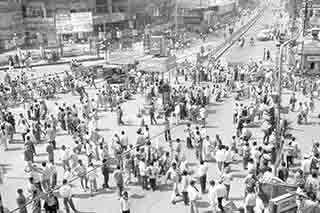
In Karnataka, the strike campaign in Karnataka was organized as a part of Joint committee of Trade Unions comprising 10 central trade unions. AICCTU had a good presence in the campaign towards the Strike in areas surrounding Electronic City, Information Technology Park Ltd (ITPL) and Yelahanka. In one MNC, workers in a readymix concrete industry in Bangalore joined our union and consequently, the local CITU was not willing to work jointly with us. AICCTU organized a separate bike rally campaign, and also a rally and public meeting on February 28 to enforce the strike. Workers marched through the streets of the bigger industrial belt of international capital in Bangalore and forced the shut-down of several companies where there was no union. The rally in surrounding areas of ITPL was very militant and culminated in a public meeting addressed by AICCTU leaders. The rally at Veerasandra, near Electronic City was joined by AITUC workers, and the strike was enforced in all factories where there was no union. The rally and public meeting organized at the city centre was very militant and the traffic in the nerve centre of the city was thrown out of gear for more than 3 hours. Leaders of CITU, AICCTU, AITUC, TUCC, AIUTUC as well as HMS, BMS and INTUC addressed the gathering.
In Koppal District, AICCTU organized independent campaign meetings at various industrial centres in the district including Gangavati, Karatagi and Koppal. The rally on February 28 was attended by more than 500 workers from rice mills, construction, brick kilns and also auto technicians and taxi and tractor drivers. In Davanagere district, AICCTU organized an impressive rally at Harappanahalli, in which hundreds of construction and agricultural labour participated in enforcing the strike. AICCTU organized a demonstration at Harihar, a prominent town in the same district. In Mysore District, AICCTU organized a demonstration jointly with AITUC at HD Kote taluk in which construction and agricultural labour participated.
In Puducherry, AICCTU, AITUC, CITU, INTUC, BMS LPF, TUCC, and AIUTUC formed a state level joint action committee and conducted a week long campaign throughout Puducherry and Karaikal regions from 20-27 February. At nine centres the workers of all above central TUs courted arrest in Puducherry. In the rural region of Villianur, AICCTU blockaded the railway track, in which hundreds of workers took part, most of them women. All were arrested and later released in the evening. In Puducherry town 125 workers of various factories courted arrest. In Puducherry and Karaikal, BSNL, LIC, Bank employees participated in the strike, and the strike was total. A major union of state government workers namely ‘Central Federation of government employees’ fully participated in the general strike. 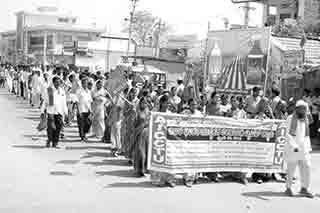
In West Bengal, the Strike was very successful, with spirited participation from all sections of workers. Here, as part of the nationwide rural strike call given by the AIALA, meetings were held in more than four hundred panchayats. Demonstrations were held at 35 blocks and roads were blockaded at several places.
In Assam, the Strike took the shape of Assam Bandh. In Silchar, out of the 250 arrested while picketing the Deputy Commissioner’s Office, more than 150, most of whom were ASHA women, were affiliated to AICCTU. At Badarpur Railway junction, Rail traffic was totally disrupted. The oil sector too witnessed significant participation. The Digboi and the Numaligarh Refinery were totally at strike. In Oil India Head Quarters at Duliajan, the main organizer was the contractual and Motor Shramik Worker’s Unions and unrecognized unions of regular workers. In Guwahati Refinery, the INTUC-affiliated Guwahati Refinery Workers’ Union betrayed the Strike totally, however, the strike was partially successful, due to efforts of the AICCTU-affiliated united workmen’s union – the only struggling contractual workers’ union. The All Assam Contractor Workers’ Union affiliated to AICCTU took active part in paralyzing works in Dinjan Army cantonment, Chabua Airforce Station and Mohanbari Air Port (partially).
Throughout the state, at various points, there was a road blockade. The Jorhat road-block was a joint initiative of AISA, AICCTU, ASCSS etc. and 50 were arrested, and there was a good response to the strike call by various transport workers’ unions.
In Punjab, contract workers of PGI, Chandigarh, affiliated to AICCTU, and mess workers of Punjab Engineering College, Sec. 16 Hospital Union, Sec. 32 Hospital Union, and workers from health sector’s malaria department participated in the strike. Brick-kiln and rural workers in Mansa and Sangrur led by AICCTU went on strike.
In Andhra Pradesh, nine left parties held a dharna at Hyderabad and the leaders, including Com. Murthy, Politburo member of CPI(ML), were arrested from the dharna. In Khammam district of Andhra AICCTU held rallies in three mandals. In Vijayawada, Krishna district and Visakapattnam Narasipetta rallies were held. 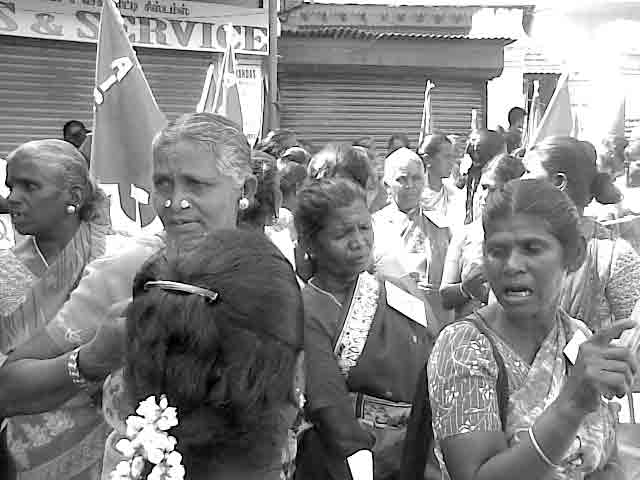
In Odisha, CPI(ML) and AICCTU along with CITU, AITUC, AIUTUC, and HMS organised strike actions at Rayagada, Bhubaneswar, Rourkella, Kendrapara, Puri and Khurdha. Railway Sweepers Union joined at Bhubaneswar and Puri, autoworkers, Anganwadi workers at Kendrapara and ragpickers and rickshaw pullers joined at Bhubaneswar along with other workers and transport workers’ union at Rayagada. At Puri Comrade Ashok Pradhan was arrested along with Dilip Samal of East Coast Railway Sweeper Workers Union. The Maa Kalijayee Motorboat Workers Union and CPI(ML) protested at Balugan. At Rourkela, a protest was jointly held with CITU and AITUC under the leadership of Comrade NK Mohanty, President of AICCTU Odisha. At many places our comrades were arrested by the Odisha police. The strike was a huge success in the State as towns and businesses were completely closed. The railways was affected in a big way and petrol pumps, autos, bus services were out of operation and banks and insurance companies were closed including Nabard and RBI.
In Andaman and Nicobar, AICCTU, CITU and BMS jointly conducted a one-week long street corner meetings and public meetings in preparation for the strike. On the day of the Strike, a one day Dharna at Tiranga Park, Port Blair, was followed by a procession through the main Aberdeen Bazar to Secretariat gate, Port Blair, concluding in a mass meeting addressed by leaders of Central Trade Unions. BSNL and all the bank employees went on strike in A&N Islands.
In Madhya Pradesh, the Nagar Nigam Karamchari Kalyan Morcha (municipal employees’welfare front) at Gwalior, affiliated to AICCTU, organised a rally and meeting at Bara. A Gwalior bandh took place on February 28. In Bhind, Hamal workers and other Left TUs held a joint rally and meeting. More than 200 workers participated here.
In Rajasthan, a joint rally of 2500 was held at Jaipur. In Udaipur AICCTU played major role in organizing the Strike. In Ajmer and Pratapgarh also we participated in joint rallies and strike.
West Bengal
TU Rights Under Attack
Sukanta Mandal
In Mamata Banerjee’s rule in West Bengal, state government employees are having a rough time. Not only have the dearness allowance and other dues of the regular employees been withheld, the usual salary and pension of the employees of the state PSUs are being delayed for months together. The convenient plea has been acute fund crunch left over by the previous LF government. Driven by extreme desperation, one transport employee had to commit suicide because of inordinate delay in payment of wages.
The latest onslaught on the employees has been the highhanded approach adopted by the WB government to thwart the general strike on 28th February. A veritable reign of terror was unleashed on the employees to scare them away from participating in the strike. The Government initially issued a radiogram on the eve of the strike stating that no leave would be granted for absence on the strike day. The Chief Minister went to the extent of threatening the employees that if they participate in the strike, “they would be taught such a lesson that they would not dare to participate in any strike in future.”
In the face of this threat and in the absence of a resolute leadership to motivate and mobilize them into the strike, a large number of employees had to attend office on the strike day, albeit reluctantly. Still, quite a good number did participate in the strike and abstained from work on the strike day.
After the strike, the government issued another Memorandum directing the Heads of Offices to issue Show Cause notice to the concerned employees who were absent on 28.02.2012 asking them to explain why action would not be taken against them for such unauthorized absence in violation of the earlier circular. After receipt of reply, leave was directed to be granted only on production of documentary evidence in certain stipulated cases, e.g.hospitalisation, bereavement in the family, severe illness and absence continuing from before, employees who had been on sanctioned leave continuing from before and compelling reasons of similar nature, except dislocation of traffic, which would not be accepted as a reason. Where absence is not covered by any of the above, no-work-no pay would come into force, and no salary would be admissible for that day. Those who do not respond to the show cause notice would be liable to disciplinary action. Even the school and college teachers of government-aided institutions were not spared.
Faced with such a situation and finding that the mainstream employees’ organizations predominantly influenced by the CPI(M) did not come forward to organize resistance against such repressive measures of the government, the AICCTU together with “Paschimbanga Rajya Sarkari Sangrami Karmi Samannay”, a struggling forum of the employees, organized a Mass Convention against this attack on the TU rights and right to strike of the state government employees on 20th March at the Students Hall, College Square, Kolkata, where all the Left employees’ organizations along with some leading legal personalities were invited. Wide campaign was carried out to mobilize the employees in the convention and wide interaction with the employees was undertaken.
The Convention evoked much response among the employees and was attended by almost all the unions of the employees who believed in right to strike, including all the major teachers’ organizations in the state. However, the notable absentee was the Co-ordination Committee of State Government Employees’ Organizations, which is backed by the CPI(M) and have the majority of the employees in their roll. The Convention was conducted by a presidium consisting of Rajarshi Das Gupta, Dibakar Bhattacharya an Anjan Biswas. All the participating organizations hailed the timely move, supported the views expressed in the approach paper and assured to take part in any joint move to take the fight forward.
Supreme Court lawyer and human rights activist Colin Gonsalves and distinguished labour lawyer and ex-Mayor of Kolkata Bikash Bhattacharya were also present in the Convention. Gonsalves asserted that the government employees of West Bengal do have a legal right to strike in view of the WB Services (Duties, Rights and Obligations) Rules, 1980, and the employees should not have any confusion about that. However, he stressed that government employees have participated in innumerable number of strikes, and only by doing so could they establish their right to strike. The Railway workers’ strike in 1974 and the Tamil Nadu government employees’ strike in 2003 are ample testimony to that. The governments which let loose untold repression on the striking employees were ultimately thrown away by the people in the hustings. Bikash Bhattacharya, a leader of the CPI(M), attended the Convention and emphasized that the employees would have to unite to fight this onslaught on their rights. He assured to take up the case of the victims, if any, in the court of law. Speaking on behalf of the organizers of the Convention, Atanu Chakraborty said, attack on the workers and the employees is all-out today, and the employees’ movement needed to launch a resistance.
The Convention adopted a unanimous decision to form a Joint Campaign Committee to carry forward the campaign for rights of the employees, which would sit together shortly to chalk out the next course of action.